Authorities, protesters in stalemate over Ambassador Bridge blockade; arrest made
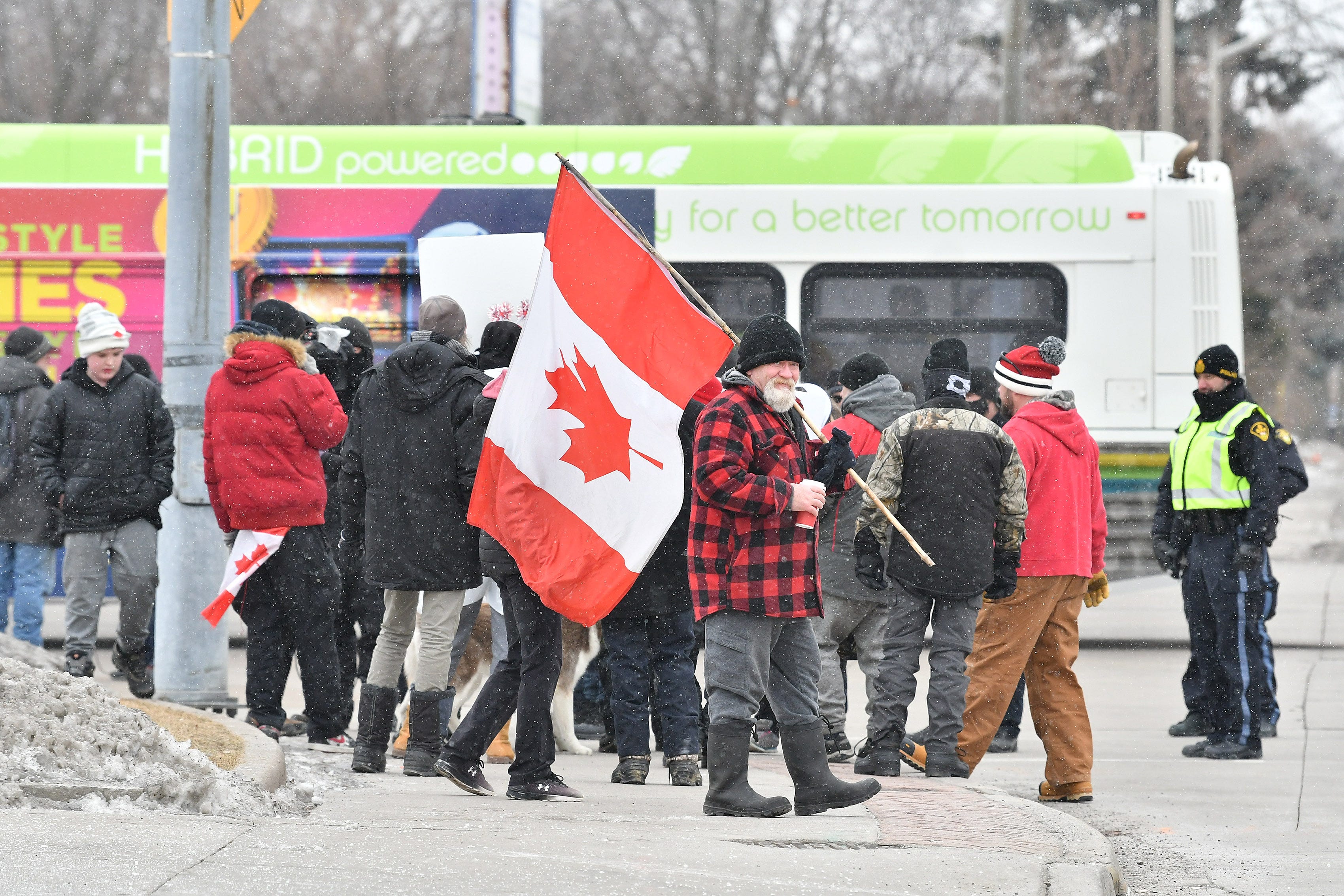
Windsor — The departure of vehicles blocking the Ambassador Bridge on Saturday raised hopes that the crossing would finally open after five days, but by evening the crowd protesting against mandatory vaccination for trucks grew near the bridge.
The demonstrators are continuing despite a massive law enforcement presence that has included making arrests, writing tickets and towing vehicles, as they have vowed they would. But as Day 5 of the blockade neared its finish, a stalemate lingered between protesters and the police.
Police enforcement of injunctions has become a point of controversy across Canada. Critics are questioning whether police have been proactive.
In Edmonton, the capital of the province of Alberta, honking continued despite an injunction against protesters. Mayor Amarjeet Sohi told the Edmonton Journal Saturday that "while I can’t direct police, I do encourage them to enforce the injunction."
Paula Simons, an independent senator from the province of Alberta, asked Saturday night on Twitter: "At what point does the failure or unwillingness of a police service to enforce a court ordered injunction cross over to contempt of court?"
More than 24 hours after the injunction took effect in Windsor, Chris Aikman of Comox Valley, British Columbia wrote: "Ambassador Bridge is still blocked, still no arrests. Looks like the injunction was meant to be fluff. We need to know why."
Windsor police did not respond to a query on how many arrests had been made.
In the 10 p.m. hour, Windsor police announced on Twitter the arrest of a 27-year-old man "for a criminal offence in relation to the demonstration."
The Ambassador Bridge is the conduit of 25% of all trade between the two countries and is of particular importance to the North American auto industry. Around 10,000 commercial vehicles cross the bridge every day with $325 million of goods, the Michigan Treasury Department estimated Friday. Around $50 million of that are auto parts. The blockade has caused major economic strain for automakers and other manufacturers already struggling with supply chain woes.
At 5:30 p.m. Saturday, nine hours after Canadian police began enforcing the injunction, the two sides seemed to reach a stalemate that continued deep into the evening.
“We’re here for whatever it takes,” said Denise Carlson of Windsor. “We’re staying right here.”
Carlson was one of the new arrivals, just joining the protest in the afternoon. Among the people descending upon the city were families with children.
Members of the crowd echoed Carlson’s comments, saying they planned to remain in the street and were willing to risk arrest.
The demonstrators, once vastly outnumbered by the Canadian police on scene, at times eclipsed them.
Windsor police have warned for days that "anyone blocking streets” was guilty of an offense called “mischief to property.” They've also warned that people helping the protesters risked being named "party of the offense" and would be in legal trouble.
“You could be arrested if you are a party to the offense or assisting others in the direct or indirect commission of this offense,” Windsor police said Friday.
Ultimately, police warned, “charges and/or convictions related to the unlawful activity associated with the demonstration may lead to denial in crossing the USA border.”
Still, the protests continued and even grew despite an Ontario judge’s injunction Friday that the bridge blockade must end. Windsor Mayor Drew Dilkens has described the protest as an "illegal occupation."
"I’m disappointed that it had to come to this," Dilkens said after the injunction was ordered.
At 4 p.m. Saturday, police began erecting a concrete barrier between the protesters and the foot of the bridge. They also announced for the first time that they would begin towing cars that were parked several blocks away from the span.
But the crowd was undeterred.
Several blocks from the bridge, people milled about a blocked-off street. Despite the freezing temperatures, the atmosphere was festive. They waved signs, chanted “freedom” and a woman sang “O Canada,” the national anthem.
Dozens of police, forming a line, had begun steadily pushing the protesters away from the bridge and onto nearby streets in the morning. They succeeded in clearing several lanes of traffic, but the bridge remained closed. Windsor police said they didn't know when it might reopen.
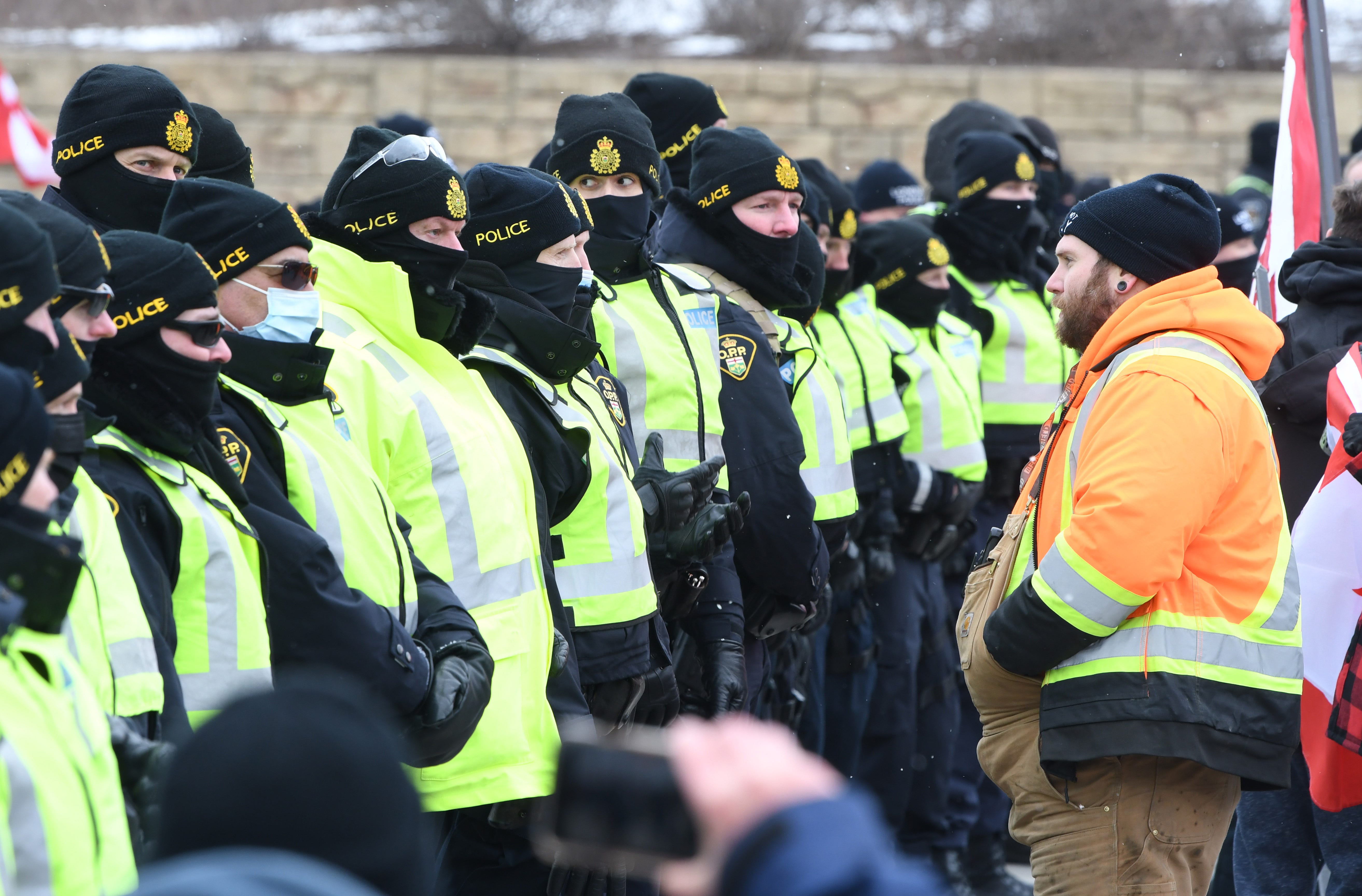
Some protesters, walking backward, shouted at the police but others bantered cheerfully with them.
The demonstrators, some waving Canadian flags and others wearing them, said they accomplished their goal even as the protest seemed at times to be winding down.
“They can’t ignore us anymore. They know what we can do,” said Marie Rice of Lakeshore, Ontario.
Rice said the Canadian government should drop its vaccine mandate immediately and never should have employed it in the first place.
“It doesn’t do a thing,” she said about vaccines. “Scientists say one thing today and another tomorrow.”
Jason Bellaire, deputy chief of Windsor police, implored the protesters to go home. He said they were successful in publicizing their grievances but would be arrested if they remained longer.
“We’re doing it in the safest manner possible,” he said about the police effort. “We’re prioritizing human life and safety.”
Bellaire said the Windsor police are being assisted by five other police forces in Canada along with the Royal Canadian Mounted Police, the country's national police force.
One group of officers wore military-style uniforms while an armored personnel carrier was parked in the neighborhood.
One of the newest protesters was Carlson of Windsor. When she learned that the rigs blocking the bridge had left, she got dressed and rushed to the scene in the afternoon. She was angry that the vehicles departed and vowed to stay put even if she was arrested.
“It’s wrong. The police work for us, not the government,” she said about the line of officers facing the crowd. “They should be ashamed of themselves.”
Carlson, wearing a Canadian flag like a cape, said the mandatory vaccine was the latest in a string of actions by Prime Minister Justin Trudeau that she resented.
Police began the day by dispersing the crowd as they enforced a Canadian judge's injunction on the bridge blockade. At about 9:45 a.m., semitrailers began to move away from the area and several protesters also appeared to choose to leave as authorities began to march toward the crowd.
The Windsor Police Department tweeted Saturday morning that people in the demonstration area were subject to arrest and advised them to leave immediately.
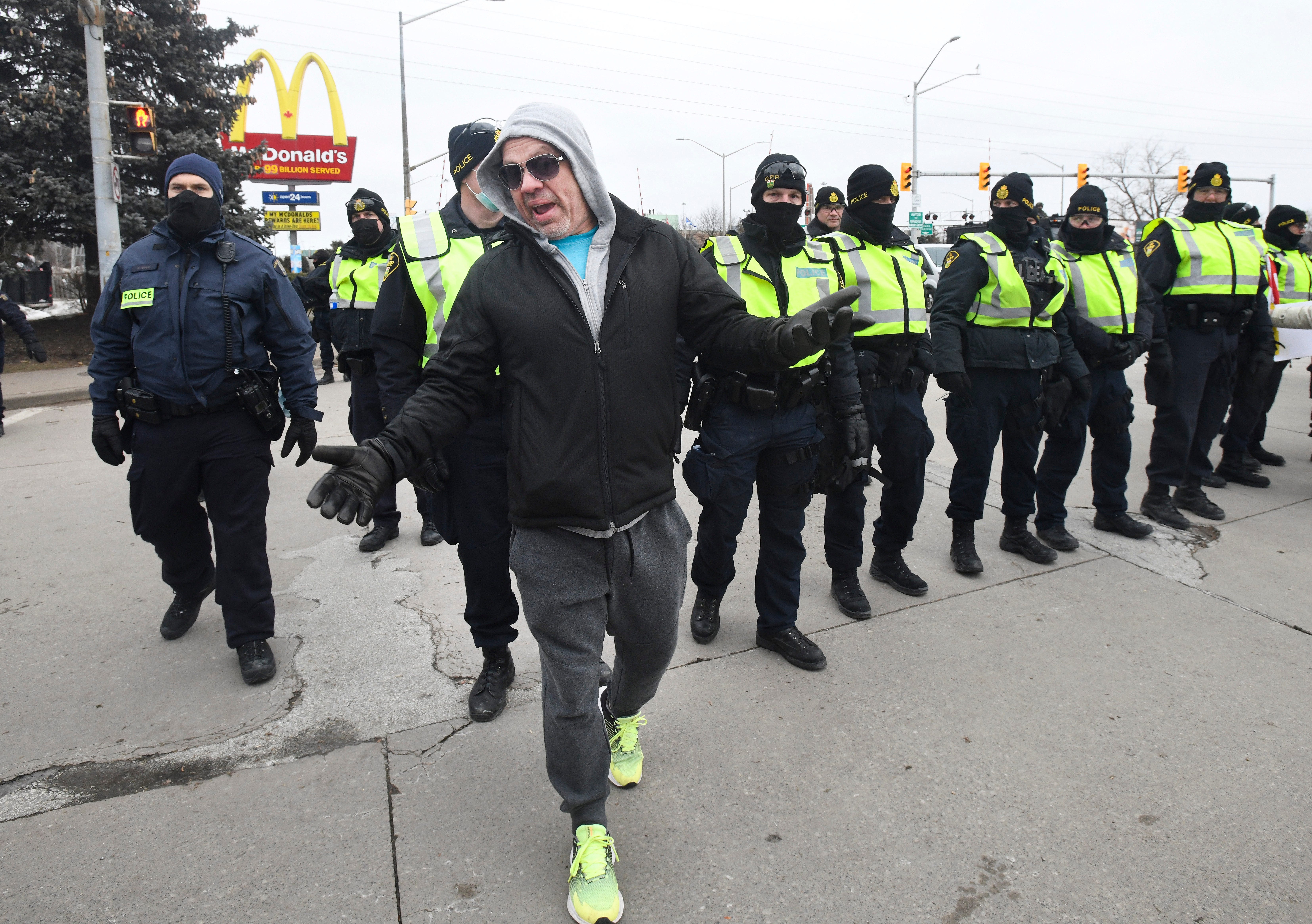
"We urge all demonstrators to act lawfully & peacefully. Commuters are still being asked to avoid the areas affected by the demonstrations at this time," the police tweeted.
► Why they're protesting: A stand to 'end all mandates' at Ambassador Bridge
► Webcams and wait times: Check these links for Ambassador Bridge, Blue Water Bridge
An Ontario judge granted an injunction Friday against protesters but crowds remained defiant after the injunction took effect at 7 p.m. Friday, hours after Canadian Prime Minister Justin Trudeau indicated "everything is on the table" to dissolve the blockade and restart traffic across the vital North American shipping route.
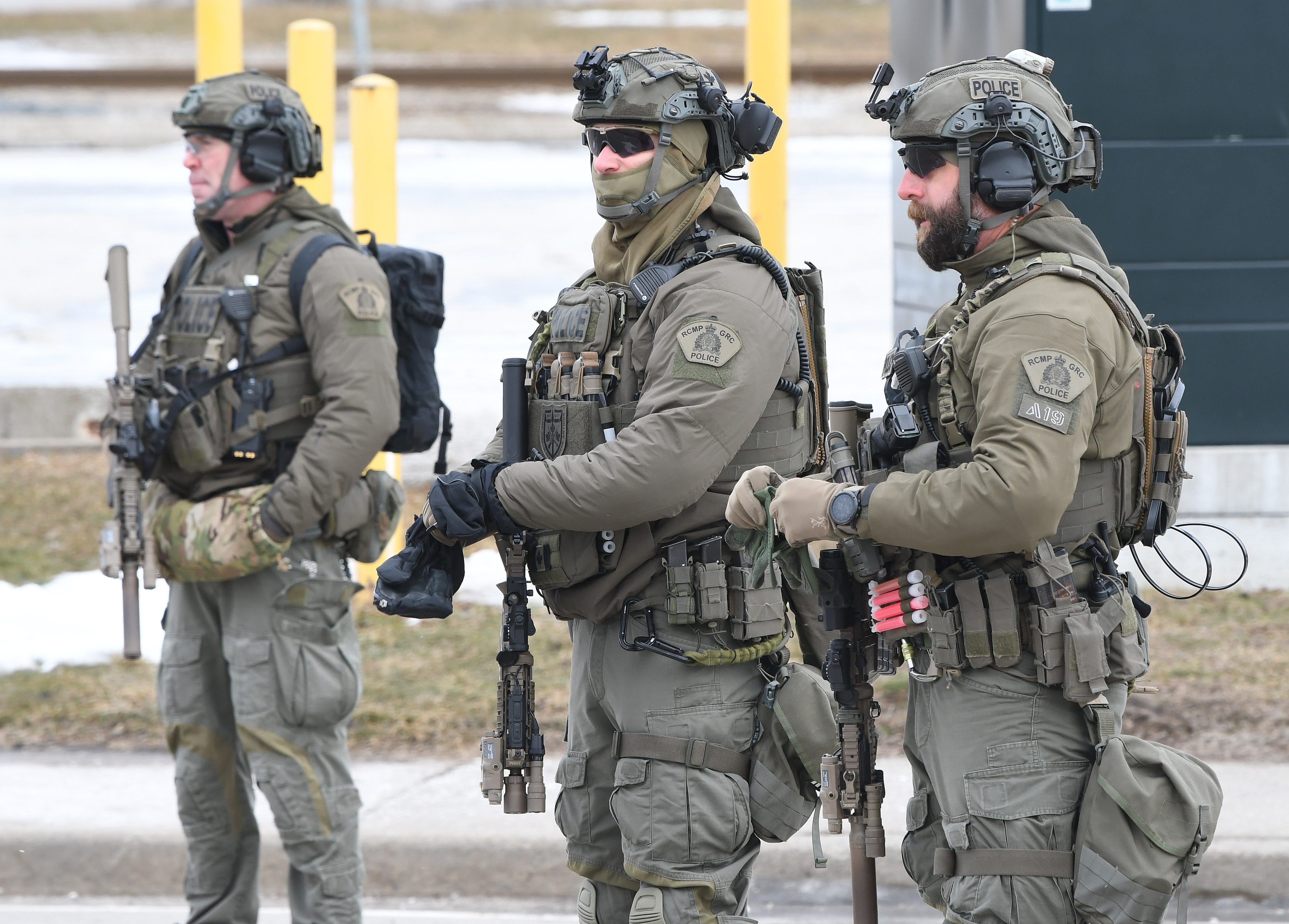
The protesters are gathered in opposition to a vaccine requirement for truckers entering the country. The United States also has a vaccine requirement for freight truckers delivering goods across the border.
Ontario officials say they will fine protesters blocking the bridge up to $100,000 and sentence them to up to a year in jail. They also will consider taking away the personal or commercial driver's licenses of anyone who defies the orders.
The orders clarify that blocking the movement of "goods, people and services across critical infrastructure" is illegal, said Ontario Premier Doug Ford, including border crossings, airports, bridges, highways and railways.
"To those trying to force a political agenda through disruption, intimidation and chaos, my message to you is this: Your right to make a political statement does not outweigh the right of hundreds of thousands of workers to earn their living," he said.
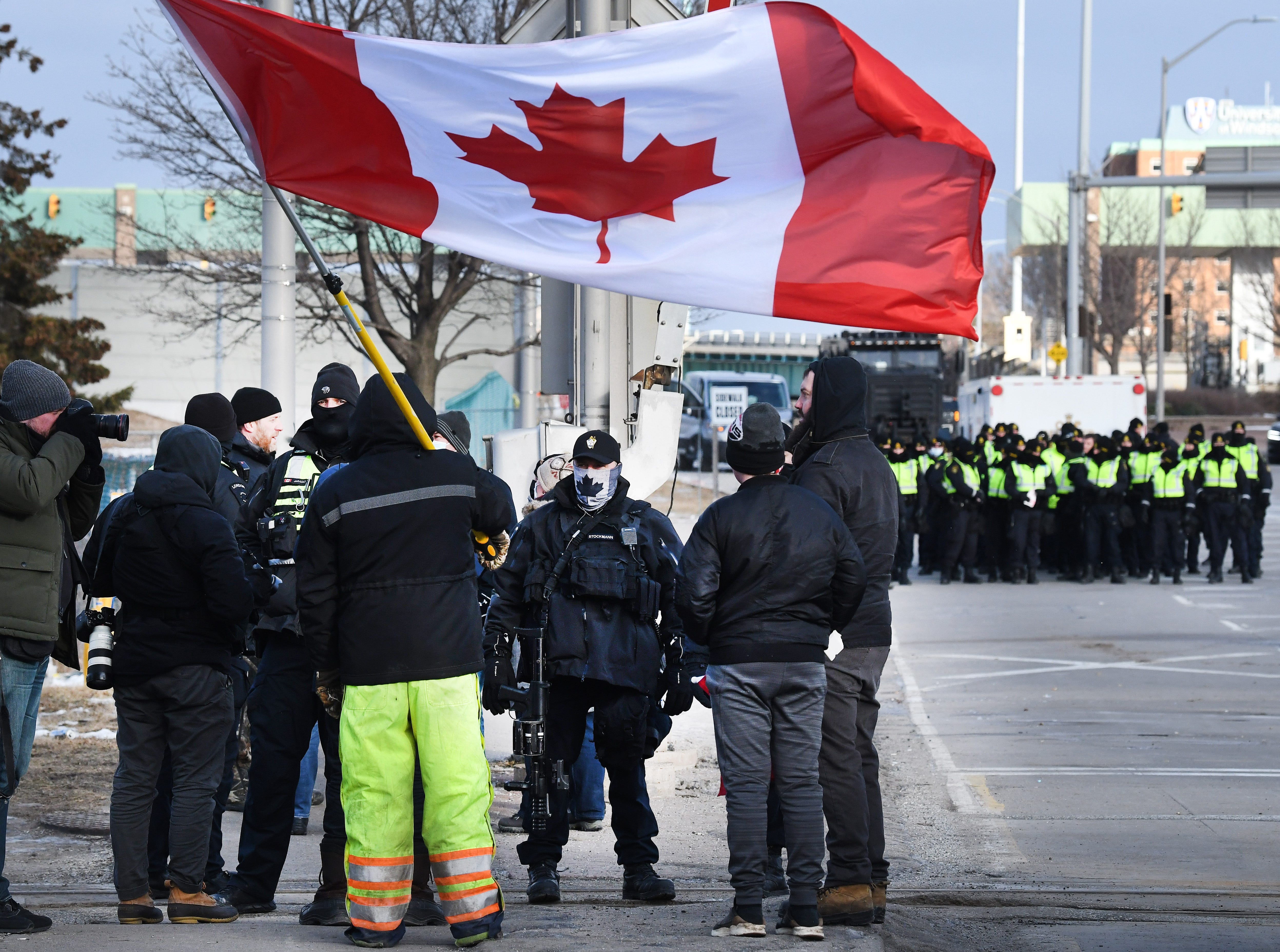
Ford has begged the protesters to leave and declared a state of emergency. He said an Ontario court granted his administration's request to freeze funds flowing to the protesters and the police have provided additional resources to back up law enforcement in Ottawa and Windsor.
The Ambassador Bridge has been blocked to traffic since Monday evening, when a protest at the Capitol in Ottawa moved to other cities across the country and the trade thoroughfare connecting Canada to Detroit.
Officials have continued to reroute commercial traffic to the Blue Water Bridge in Port Huron, where they say nine commercial lanes are open, and to the Windsor tunnel for smaller passenger traffic.

The Ambassador Bridge exit on northbound Interstate 75, Exit 47B, remains closed to traffic.
The blockade has drawn the attention of both nation's highest officeholders. Trudeau and President Joe Biden spoke Friday about the standoff.
The prime minister promised quick action in enforcing the law and the president thanked him for the steps he and other Canadian authorities are taking to restore the open passage of bridges to the United States, said White House Press Secretary Jen Psaki.
"The Biden administration has continued its work overnight and engaged in productive conversations with our Canadian counterparts over the last 24 hours to bring the blockade at the Ambassador Bridge and other ports of entry to a swift and peaceful end," a White House official told The Detroit News Friday. "We feel confident that at the municipal, provincial and federal level, Canada appreciates the urgency required to take action."
Michigan Gov. Gretchen Whitmer also has called on Canadian authorities to resolve the dispute and offered heavy equipment, security and other resources to assist in ending the blockade.
"We have got to push to resolve this and it has to be swift," she said. "Of course, we want it to be safely done as well. But it has to happen. We cannot let another minute go by unnecessarily because this border is too important to our economy, to our homeland security, and as we grow our economy, it's a crucial moment.”
fdonnelly@detroitnews.com
(313) 223-4186
Twitter: @prima_donnelly